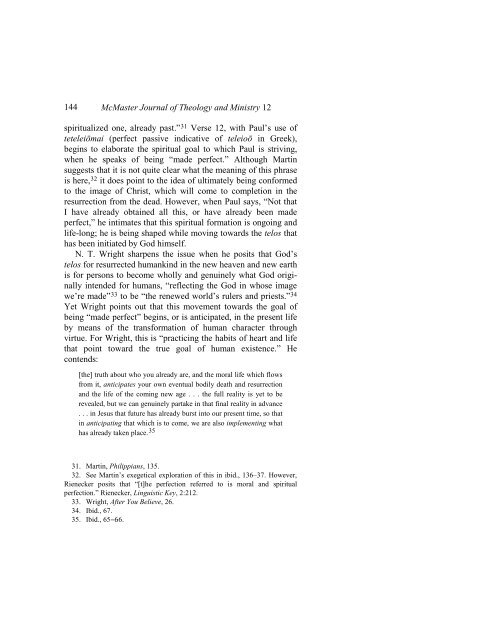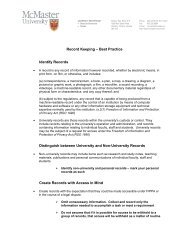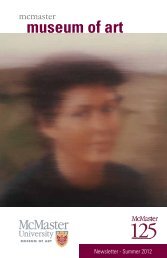Pilgrimage: A Paradigm for Spiritual Formation - McMaster University
Pilgrimage: A Paradigm for Spiritual Formation - McMaster University
Pilgrimage: A Paradigm for Spiritual Formation - McMaster University
You also want an ePaper? Increase the reach of your titles
YUMPU automatically turns print PDFs into web optimized ePapers that Google loves.
144<br />
<strong>McMaster</strong> Journal of Theology and Ministry 12<br />
spiritualized one, already past.” 31 Verse 12, with Paul’s use of<br />
teteleiōmai (perfect passive indicative of teleioō in Greek),<br />
begins to elaborate the spiritual goal to which Paul is striving,<br />
when he speaks of being “made perfect.” Although Martin<br />
suggests that it is not quite clear what the meaning of this phrase<br />
is here, 32 it does point to the idea of ultimately being con<strong>for</strong>med<br />
to the image of Christ, which will come to completion in the<br />
resurrection from the dead. However, when Paul says, “Not that<br />
I have already obtained all this, or have already been made<br />
perfect,” he intimates that this spiritual <strong>for</strong>mation is ongoing and<br />
life-long; he is being shaped while moving towards the telos that<br />
has been initiated by God himself.<br />
N. T. Wright sharpens the issue when he posits that God’s<br />
telos <strong>for</strong> resurrected humankind in the new heaven and new earth<br />
is <strong>for</strong> persons to become wholly and genuinely what God originally<br />
intended <strong>for</strong> humans, “reflecting the God in whose image<br />
we’re made” 33 to be “the renewed world’s rulers and priests.” 34<br />
Yet Wright points out that this movement towards the goal of<br />
being “made perfect” begins, or is anticipated, in the present life<br />
by means of the trans<strong>for</strong>mation of human character through<br />
virtue. For Wright, this is “practicing the habits of heart and life<br />
that point toward the true goal of human existence.” He<br />
contends:<br />
[the] truth about who you already are, and the moral life which flows<br />
from it, anticipates your own eventual bodily death and resurrection<br />
and the life of the coming new age . . . the full reality is yet to be<br />
revealed, but we can genuinely partake in that final reality in advance<br />
. . . in Jesus that future has already burst into our present time, so that<br />
in anticipating that which is to come, we are also implementing what<br />
has already taken place. 35<br />
31. Martin, Philippians, 135.<br />
32. See Martin’s exegetical exploration of this in ibid., 136–37. However,<br />
Rienecker posits that “[t]he perfection referred to is moral and spiritual<br />
perfection.” Rienecker, Linguistic Key, 2:212.<br />
33. Wright, After You Believe, 26.<br />
34. Ibid., 67.<br />
35. Ibid., 65‒66.
















